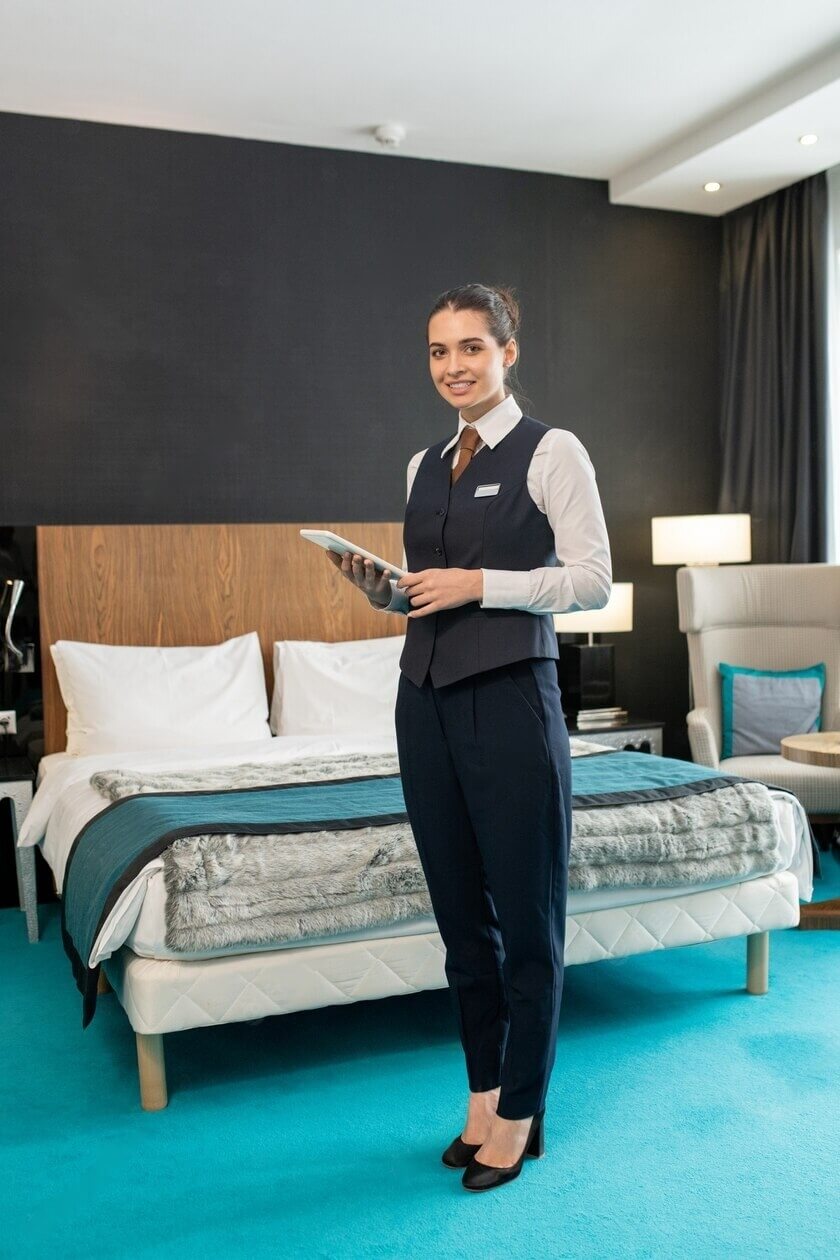In the ever-evolving landscape of the hospitality industry, effective communication plays a key role in creating memorable experiences for guests. Pre-stay, in-stay and post-stay communication are touchpoints that allow hoteliers to engage with guests and exceed their expectations. By leveraging these communication phases, hoteliers can build strong relationships with their guests, enhance customer satisfaction, and ultimately drive repeat bookings and positive reviews.
Let’s explore the importance of pre-stay, in-stay and post-stay communication and how this valuable information can enable hoteliers to optimize their interactions.
Table of contents
- Why Pre-stay Communication Matters
- 1 Understanding Guest Preferences and Needs
- 2 Personalizing the Guest Experience
- 3 Anticipating and Addressing Concerns
- Enhancing the In-stay Experience
- 1 Welcoming and Orienting Guests
- 2 Providing Timely and Relevant Information
- 3 Offering Personalized Recommendations
- The Power of Post-stay Communication
- 1 Requesting Feedback and Reviews
- 2 Nurturing Customer Loyalty
- 3 Generating Referrals and Repeat Bookings
- Best Practices for Effective Communication
- 1 Leveraging Technology and Automation
- 2 Adopting a Conversational Tone
- 3 Engaging Guests through Multiple Channels
- 4 Being Responsive and Proactive

Why Pre-stay Communication Matters
Understanding Guest Preferences and Needs
Pre-stay communication enables hoteliers to gather essential information about guests’ preferences and needs. By sending pre-arrival questionnaires or personalized emails, hotels can obtain insights regarding room preferences, dietary restrictions, special occasion or simply thank the guest for choosing this hotel over all others. This valuable information allows hotel staff to make necessary arrangements and tailor the guest experience accordingly, creating a sense of anticipation and delight.
Personalizing the Guest Experience
Effective pre-stay communication sets the stage for a personalized guest experience. By acknowledging guests’ preferences and anticipating their needs, hotels can create a welcoming atmosphere right from the start. Personalized welcome messages, tailored room amenities, and special touches based on guest profiles contribute to an unforgettable stay, leaving guests feeling valued and appreciated.
Anticipating and Addressing Concerns
Pre-stay communication also provides an opportunity to address any concerns or questions guests may have before their arrival. By promptly responding to inquiries and providing comprehensive information about hotel facilities, services, and local attractions, hotels can instill confidence in their guests and alleviate any potential anxieties. Clear communication helps set realistic expectations, ensuring a smooth and enjoyable stay.
Enhancing the In-stay Experience
Welcoming and Orienting Guests
Upon arrival, in-stay communication plays a vital role in making guests feel welcome and well-informed. Warm greetings from staff, clear directions to room assignments and a brief overview of hotel amenities and services help guests settle in quickly. Providing information through various digital tools can not only assist guests in easier navigating the property and exploring nearby attractions, but also helps to our contribution to the environment, saving tons of printing paper.
Providing Timely and Relevant Information
Throughout a guest’s stay, timely and relevant communication is crucial for ensuring a seamless experience. Hotels can leverage various channels such as mobile apps, in-room tablets, text messages to share important updates, event notifications, or exclusive offers. Providing information about dining options, spa services, recreational activities, and local recommendations enables guests to make the most of their stay and feel well taken care of.

Offering Personalized Recommendations
In-stay communication presents an opportunity for hotels to offer personalized recommendations tailored to each guest’s preferences. By analyzing guest data and using intelligent algorithms, hotels can suggest nearby attractions, restaurants, or activities that align with the guest’s interests. Personalized recommendations not only enhance the guest experience but also increase the likelihood of positive reviews and word-of-mouth referrals.
Responding in Real-Time
The in-stay communication enables guests to communicate their needs and preferences, ensuring that all orders and requests delivered to front office, housekeeping and maintenance teams, are met promptly and efficiently.

The Power of Post-stay Communication
Requesting Feedback and Reviews
Post-stay communication provides one more chance to gather feedback and reviews from guests. Sending a post-stay survey or follow-up email allows hotels to gain insights into the guest’s experience, identify areas for improvement and address any concerns promptly. Positive feedback can be leveraged as testimonials, while negative feedback can be used to make necessary changes and demonstrate a commitment to guest satisfaction.
Nurturing Customer Loyalty
Building customer loyalty is crucial for sustained success in the hospitality industry. Post-stay communication offers an opportunity to express gratitude to guests for choosing the hotel and to cultivate a lasting relationship. Personalized thank-you notes, exclusive loyalty program offers or special discounts for future stays can help nurture customer loyalty and encourage repeat bookings.
Generating Referrals and Repeat Bookings
Satisfied guests are more likely to recommend a hotel to their friends, family and colleagues. By incorporating post-stay communication strategies, hotels can encourage guests to refer their acquaintances and reward them for doing so. Implementing a referral program or offering incentives for future bookings can significantly increase the chances of generating referrals and securing repeat business.

Best Practices for Effective Communication
To optimize pre-stay, in-stay, and post-stay communication, hoteliers should consider the following best practices:
Leveraging Technology and Automation
Investing in communication technology and automation tools streamlines the process and ensures timely interactions. Utilizing customer relationship management (CRM) systems, in-built Artificial Intelligence and email marketing platforms can help personalize messages, automate responses and track guest preferences, facilitating seamless communication at scale.
Adopting a Conversational Tone
Communicating with guests in a conversational tone helps create a friendly and approachable atmosphere. Using simple language, personal pronouns and active voice makes guests feel like they are having a genuine conversation rather than receiving generic communications. This fosters a connection and enhances the overall guest experience.
Engaging Guests through Multiple Channels
Guests have varying preferences for communication channels. Offering multiple options such as email, SMS, mobile apps, social media, and live chat ensures guests can choose their preferred method. It is important to monitor and respond promptly across all channels, providing consistent and personalized communication throughout the guest journey.
Being Responsive and Proactive
Promptly responding to guest inquiries, requests or feedback demonstrates attentiveness and a commitment to guest satisfaction. By being proactive and anticipating guest needs, hotels can surpass expectations and leave a lasting impression. Timely resolutions to any issues or complaints contribute to the overall guest experience and help build a positive reputation.
Effective communication throughout the pre-stay, in-stay and post-stay phases is essential for creating memorable guest experiences and fostering strong relationships by personalizing interactions, anticipating needs and engaging guests at every stage.